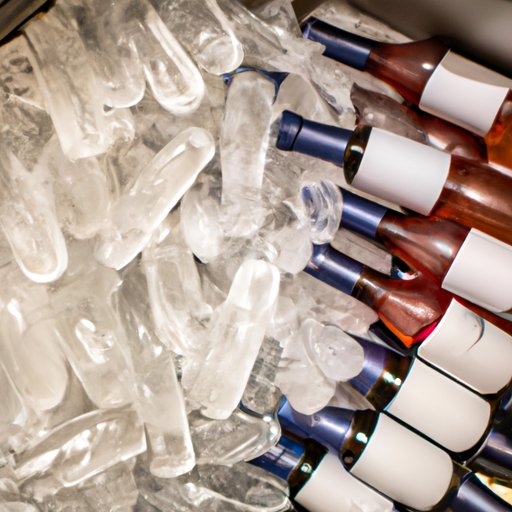
Introduction
Picture this: you just got home from work or a long day of running errands, and you’re ready to relax with a nice cold glass of wine. The only problem is, your bottle of wine is at room temperature, and you don’t want to wait hours for it to chill in the fridge. So, can you put wine in the freezer? Is it safe? In this article, we will explore the dos and don’ts of freezing wine, along with alternative methods for chilling your wine.
The Dos and Don’ts of Freezing Wine: Is it Safe to Put Wine in the Freezer?
On a hot summer day, it’s tempting to put your bottle of wine in the freezer to chill it quickly. While this may seem like a quick and easy solution, it’s not always safe. The first thing to consider is the type of wine you’re planning to freeze. Different wines react differently to freezing temperatures. For example, dry and sparkling wines freeze better than sweet wines. Another consideration is how to properly seal the bottle to avoid leaks and breakage.
There are pros and cons to freezing wine. The pros are that it’s a quick and easy way to chill your wine and to keep it fresh for longer. The cons, however, include the potential for leaking, breaking, or exploding bottles due to pressure changes and the possible alteration of the wine’s flavor profile and texture. Additionally, freezing wine can alter its chemical balance and affect its overall quality.
Therefore, if you decide to freeze your wine, there are some dos and don’ts to follow. First, make sure to use a container that is suitable for the freezer and can handle the expansion of the wine when it freezes. Use a container with a lid, seal it tightly, and label it with the date and variety of wine. Red wines should not be frozen for longer than 15 minutes, while white wines can handle longer freezing times of up to 45 minutes.
Chill Out: How to Properly Chill Wine Without Freezing it
If you’re worried about the safety of freezing wine, there are other methods for chilling your wine. One classic method is refrigeration. Simply place your wine bottle in the fridge for about 30 minutes before serving. This method is suitable for most wines and won’t alter their flavor or texture.
Another option is to use an ice bucket, which is a festive way to keep your wine cool. Fill the bucket with ice and water, and place your wine bottle in the bucket. This method cools down your wine faster than refrigeration and won’t alter its flavor or texture. However, it’s important to give your wine enough time to chill to the ideal temperature for its type before serving.
To Freeze or Not to Freeze? A Guide to Storing Wine in Your Freezer
If you decide to store your wine in the freezer, be aware of the ideal temperature and storage time. The ideal temperature for frozen wine is -5 to -1°C (23-30°F). If kept at this temperature, your wine can be stored for up to 6 months. However, if left for longer, your wine may become oxidized and lose its flavor profile.
When it comes to thawing frozen wine, it’s important to let it thaw slowly in the refrigerator, taking it out of the freezer at least a day before you plan to serve it. Avoid thawing it at room temperature or in the microwave, as both methods can ruin the texture and taste of the wine.
The Science Behind Freezing Wine: What Happens When You Pop a Bottle in the Freezer
Have you ever wondered what happens to your wine when it’s frozen? The answer lies in the science of wine chemistry. Wine contains water, alcohol, minerals, and organic compounds, all of which react differently to cold temperatures. When the wine is frozen, the water content expands and may break the cork or bottle, leading to leaks and breakages. Additionally, the organic compounds may get affected by the freezing, leading to a possible alteration in taste or a loss of flavor.
Another consideration is that some types of wine may not freeze properly due to their chemical composition. Sweet wines, for example, have a higher sugar content than dry wines, which can prevent them from freezing correctly. For this reason, it’s important to research and understand your wine’s specific needs before storing or freezing it.
Maximizing Your Wine’s Shelf Life: Alternative Ways to Chill Your Wine
If you’re looking for alternative ways to prolong your wine’s shelf life, consider using a vacuum sealer. A vacuum sealer removes the air from the bottle, preventing oxidation and prolonging freshness. Another option is to invest in a wine fridge, which can keep your wine at the ideal temperature and humidity for optimal preservation.
Keep in mind that each method has its benefits and drawbacks. Vacuum sealing may provide an airtight seal but can be time-consuming and may require special equipment. A wine fridge may keep your wine at the ideal temperature, but it may also be bulky and expensive. Consider your needs and budget when choosing the best method for you.
Conclusion
In conclusion, freezing wine can be a quick and easy way to chill it, but it’s not always the safest option. By following the dos and don’ts of freezing wine, you can enjoy a perfectly chilled glass of wine without compromising its quality or integrity. Alternatively, refrigeration and ice buckets are classic methods for chilling your wine, while vacuum sealing and wine fridges are alternative options for prolonging your wine’s shelf life.




